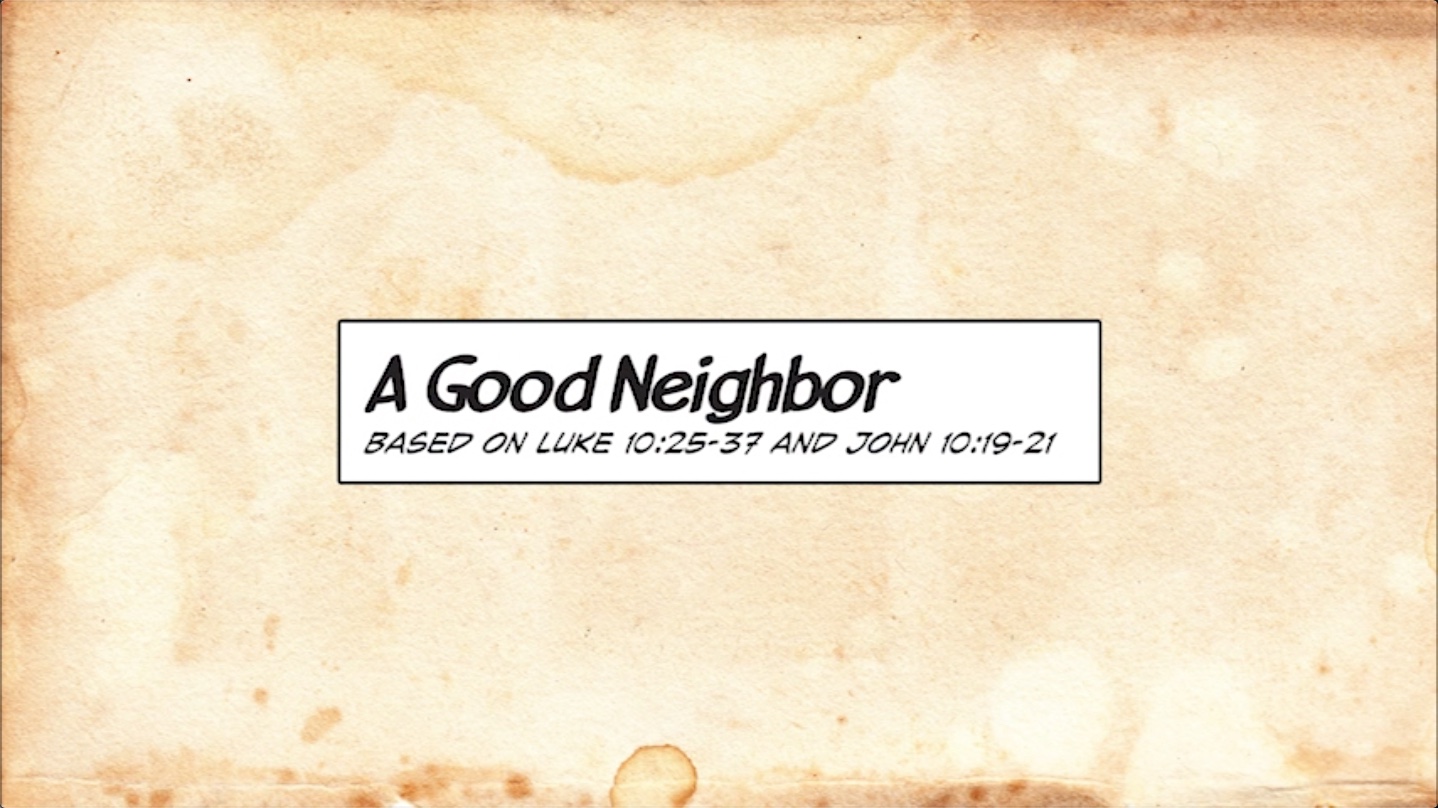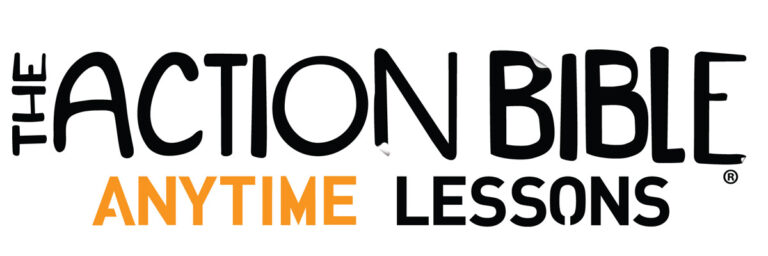
The question a lawyer asked Jesus, “Who’s my neighbor?,” might have been tossed Jesus’ way to make Him struggle—but that’s not how it turned out. The story Jesus told in response took the lawyer exactly where Jesus wanted the man to land: We’re neighbors when our love reaches out and serves.
Today we’ll GET INTO the story Jesus told and walk the path that the priest, the Levite, and the Samaritan walked. After the video, we’ll TALK IT UP and ACT IT OUT, discovering what it means to us that Jesus’ love reaches out.
Round up everyone and watch “A Good Neighbor.” As you watch, imagine what it would be like to be beaten and, hurt so badly you couldn’t get up only to hear several sets of footsteps pause and then hurry on by. And how it would feel to finally get help—from your enemy!


In today’s video Jesus teaches a lawyer—and us—a valuable lesson about being a good neighbor: It takes love. Love that notices when there’s a need and does something about it. Love that reaches across divisions and connects with others. That’s exactly how Jesus loves us!
Use these questions to TALK IT UP and explore what God’s Word says about how Jesus loves … and how we’re to love others.
- If you had to sum up the point of Jesus’ story in one sentence, what would that sentence be?
- Where do you see a love that reaches out in this story? Why would Jesus’ audience think it appeared in an unexpected place?
- Which of the 3 travelers reminds you of you—the cautious priest, the too-busy Levite, or the jump-in-to-help Samaritan? Why?
- Think about your neighbors. What can you do to be helpful to one of them? When can you do it?

Jesus told the story about a Samaritan and a wounded traveler to answer this question: “Who’s my neighbor?” But Jesus never summed up what the lawyer was supposed to learn—Jesus let the lawyer figure that out for himself.
We’re still figuring out how to respond to Jesus’ story. Yes, we want to care for others, but we have limited time and money. Yes, we want to serve others, but what if they take advantage of us?
Jesus’ answer was to paint a picture of His love for us. Jesus’ love sees us in our need, responds, and then goes the second mile to bring us to wholeness. That’s a fair description of what Jesus did coming to earth, walking with us, and then dying for our salvation.
And it’s a fair summary of what the lawyer was meant to see in Jesus’ answer.
Who’s our neighbor? Anyone who needs us … even those who aren’t feeling all that neighborly toward us.
Choose one (or more) of these neighborly acts and give it a try—right now!
- Make a list of people you’re not excited about helping—that bully who humiliated you, an unfair teacher or boss, someone who cheated you. Write “My Neighbors” at the top of your list. With a partner, pray for the people on your list. Commit to praying daily for each of them for a week.
- Do something loving for a family member. When reaching out in love, it can be easy to reach past the people who are right in front of us.
- Get ready for a Good Samaritan moment. As a group, answer each of these questions:
- What phone number would you call for help?
- How would you get to the closest emergency room or urgent care facility?
- What would you say to comfort a wounded person as you waited for an ambulance to arrive?
- See what you can discover about how Jesus’ love reaches out with a quick game of Welcome to the Neighborhood?
- The first 2 travelers—the priest and Levite—were either too afraid or too busy to help. What gets in the way of you helping others? Is it busyness, fear, or something else?
- How does the story Jesus told apply when: You see a person who is homeless asking for money? A friend needs help with a task? You get a call from someone who wants to borrow one of your prized possessions?
- Practically speaking, what are the limits on how much you could or should help someone?
- This week talk with someone who doesn’t look or sound like you (a different age, a different ethnicity, etc.). See what you can find that you have in common.

Supplies:
- 12-inch chenille wires (pipe cleaners), 2 per person
Jesus used the word “neighbor” in a way that’s different than we use it. We tend to think of people who live near us. He used it to describe anyone with whom we can share God’s love in a practical way. Beaten, bloody people who’ve been kicked to the curb, for instance.
If we’re going to live out what Jesus is calling us to do, we’ve got to adjust how we see neighbors.
Directions
- Give each person 2 chenille wires. Ask everyone to use the wires to make a pair of glasses and then wear their creations. (Note: You may want to demonstrate how to do this by making a pair for yourself.)
- Explain: The purpose of eyeglasses is to correct our physical vision so we can see clearly. The Bible does the same for our spiritual sight—and this story from Jesus is a prime example.
Jesus is helping us sharpen our focus on who counts as a neighbor. The people who live near us, yes, but there’s more to it than that. The Samaritan didn’t live near the wounded traveler, yet the Samaritan acted as a true neighbor.
Anyone God puts in our path who we can help is also a neighbor. We might not be able to help, but there’s no excuse for walking by without caring. When love reaches out—and Jesus’ love reaches out—it reaches out to everyone it can touch. When we love like Jesus loves, our love reaches out too.
- With their glasses on, ask everyone to join you in praying for neighbors in need. Invite participants to call out where they see needs in the world—Christians suffering persecution in hostile nations, people struggling from illness or job loss, people feeling alone or forgotten, or specific people they know.
When suggestions taper off, pray and ask God to show each of you who He’d have you stop to help—and what that help would look like.
Close by asking everyone to say along with you, “In Jesus’ name. Amen.”
Sharing what God’s doing in and through us reminds us God is still at work, encourages other believers, and gives praise to God. Here are ways you might share what you’ve discovered about Jesus’ love reaching out:
- Buy a fast-food gift card and keep it handy. The next time you see a person who’s asking for money to buy food you’ll be able to lovingly reach out and offer something.
- Volunteer for a shift at a food pantry or soup kitchen. And do more than just ladle out soup—make eye contact with the people you serve. Ask for their names. Engage in conversation. When love reaches out, it sees people and lets them know they’ve been seen.
- Tell someone about Jesus. Jesus often reaches out to people through the loving actions of His followers. Look for opportunities to share your faith this week.
If possible, post a photo or write a story about what reaching out in love looked like for you. Use the hashtag #GodInAction so we can see what you’re up to!
